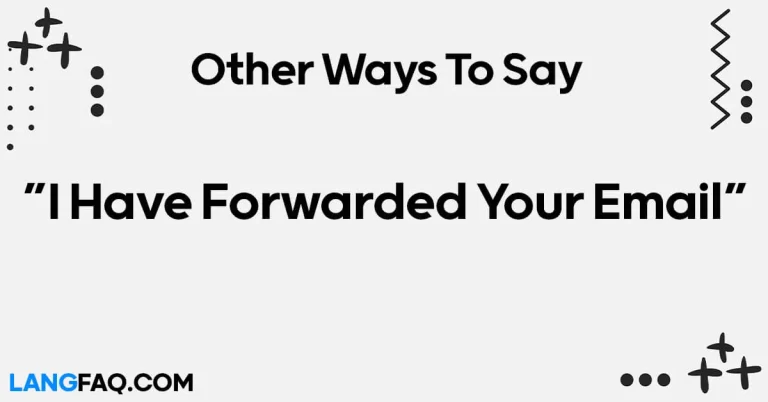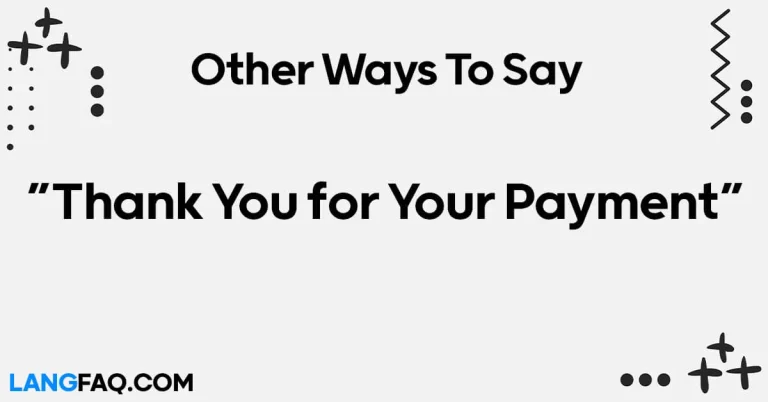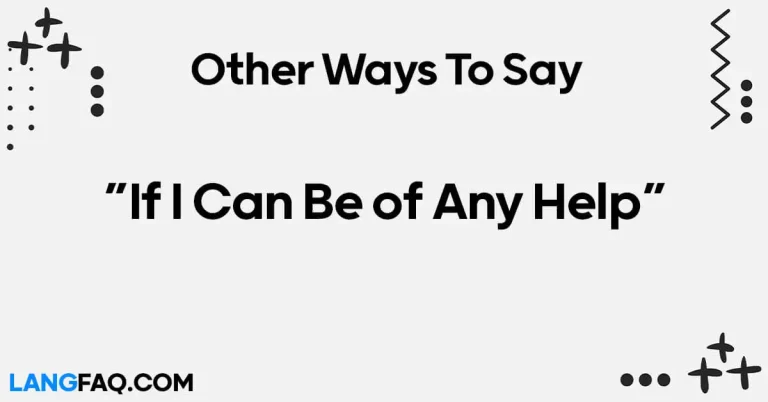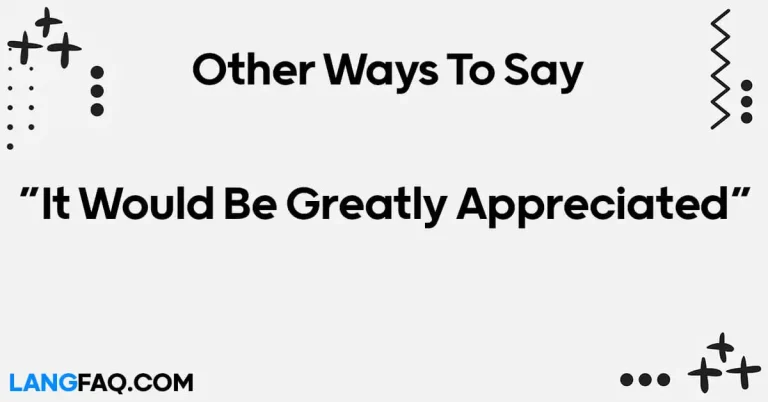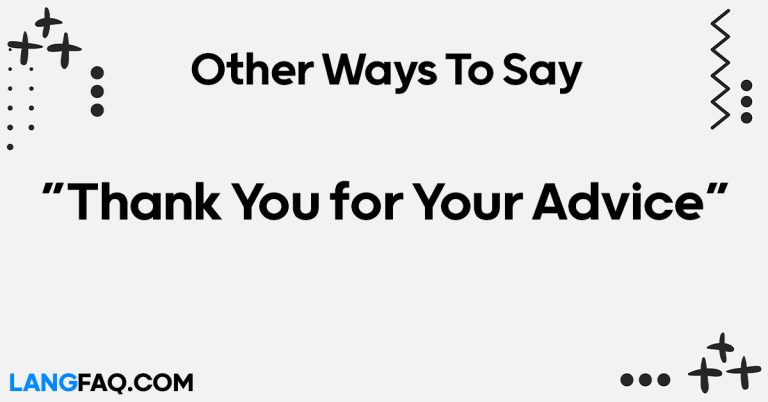In the competitive landscape of job applications, articulating your enthusiasm for a position is crucial. This article unveils 12 alternative expressions for conveying your interest in a job, providing you with a valuable toolkit to stand out in the hiring process.
12 Other Ways to Say “I Am Interested In This Position”
Here are 12 alternative ways to express “I Am Interested In This Position”:
- I am enthusiastic about joining your team.
- This opportunity aligns perfectly with my career goals.
- I am eager to contribute my skills to this role.
- Your opening resonates with my professional aspirations.
- I am genuinely excited about the prospect of working here.
- This position captivates me, and I am keen to be a part of it.
- I find the responsibilities of this role particularly appealing.
- Your company’s values and mission deeply resonate with me.
- I am motivated to bring my expertise to this challenging position.
- The idea of contributing to your team greatly excites me.
- This role perfectly fits into my long-term career plan.
- I am sincerely interested in becoming a valuable asset to your organization.
Here’s a table with meanings and examples for the 12 alternative ways to express “I Am Interested In This Position”:
| Expression | Meaning | Example |
|---|---|---|
| I am enthusiastic about joining your team. | Showing keen interest and excitement for becoming a team member. | “I am enthusiastic about joining your team and contributing my skills to foster growth.” |
| This opportunity aligns perfectly with my career goals. | Indicating that the position is in line with personal career objectives. | “This opportunity aligns perfectly with my career goals, allowing me to thrive and contribute effectively.” |
| I am eager to contribute my skills to this role. | Expressing eagerness to apply one’s skills and make a positive impact. | “I am eager to contribute my skills to this role, ensuring a valuable contribution to your team.” |
| Your opening resonates with my professional aspirations. | Conveying that the job aligns with one’s professional ambitions. | “Your opening resonates with my professional aspirations, making it an ideal fit for my career growth.” |
| I am genuinely excited about the prospect of working here. | Expressing genuine excitement and enthusiasm for the opportunity. | “I am genuinely excited about the prospect of working here and contributing to the success of the company.” |
| This position captivates me, and I am keen to be a part of it. | Conveying strong interest and eagerness to be involved in the role. | “This position captivates me, and I am keen to be a part of it, bringing my passion and dedication.” |
| I find the responsibilities of this role particularly appealing. | Expressing attraction to the specific duties and responsibilities of the position. | “I find the responsibilities of this role particularly appealing, and I am confident in my ability to excel in them.” |
| Your company’s values and mission deeply resonate with me. | Highlighting alignment with the company’s values and mission. | “Your company’s values and mission deeply resonate with me, making it an environment I am excited to be a part of.” |
| I am motivated to bring my expertise to this challenging position. | Expressing motivation to apply one’s skills to overcome challenges in the role. | “I am motivated to bring my expertise to this challenging position, where I can contribute to overcoming obstacles and achieving success.” |
| The idea of contributing to your team greatly excites me. | Conveying excitement about the opportunity to contribute to the team. | “The idea of contributing to your team greatly excites me, and I am eager to collaborate with talented professionals.” |
| This role perfectly fits into my long-term career plan. | Indicating that the position aligns with one’s strategic career goals. | “This role perfectly fits into my long-term career plan, and I am committed to growing with the organization.” |
| I am sincerely interested in becoming a valuable asset to your organization. | Expressing genuine interest in making a meaningful contribution. | “I am sincerely interested in becoming a valuable asset to your organization, bringing my skills and dedication to drive success.” |
These diverse expressions offer a rich vocabulary to articulate your interest in a job position. Whether you’re emphasizing alignment, showcasing motivation, or expressing genuine excitement, the key is to convey your enthusiasm authentically. Tailor your choice of expression to resonate with the specific attributes of the job, allowing your sincerity and passion to shine through in your job application. By using these alternatives, you can elevate your communication and leave a lasting impression on potential employers, ultimately increasing your chances of securing the desired position.
Is It Correct to Say “I Am Interested In This Position”?
Yes, “I am interested in this position” is a correct and straightforward way to convey your interest in a job or role. It’s a clear and concise expression that directly communicates your desire to be considered for the position. This phrase is commonly used in cover letters, job applications, and during interviews to express your enthusiasm and willingness to pursue the opportunity.
However, if you’re looking for alternative ways to express the same sentiment, as per the previous prompts, you can explore various phrases like “I am enthusiastic about this position,” “This opportunity aligns perfectly with my career goals,” or “I am eager to contribute my skills to this role.” Each alternative phrase adds a unique touch to your expression of interest, allowing you to tailor your message based on the tone and formality of the communication.
Professional Mail Example With “I Am Interested In This Position”
Subject: Expression of Interest in [Job Title] Position
Dear [Hiring Manager’s Name],
I trust this email finds you well. I am writing to express my sincere interest in the [Job Title] position advertised on your company’s career portal.
Having thoroughly researched [Company Name] and its commitment to [specific aspect, e.g., innovation or sustainability], I am excited about the prospect of contributing my skills and experience to your esteemed team.
My background in [mention relevant skills or experiences] aligns seamlessly with the requirements outlined for the [Job Title] role. I am confident that my [specific skills or achievements] make me a valuable candidate for this position.
I am particularly drawn to [highlight a specific aspect of the job or company] and believe that my passion for [related skill or area] would enable me to make meaningful contributions to your team.
I am impressed by the work [Company Name] has done in [mention a recent achievement or project], and I am eager to be a part of such an innovative and dynamic environment.
Thank you for considering my application. I am enthusiastic about the opportunity to further discuss how my skills and background align with the needs of your team.
I look forward to the possibility of contributing to the success of [Company Name].
Sincerely,
[Your Full Name] [Your Contact Information]
1. Expressing Eagerness: Unveiling Enthusiasm in Your Application
In the realm of job applications, expressing eagerness is paramount. This phrase communicates not only your interest but also your proactive and positive attitude towards the potential role.
When to Use:
- Formal Context: In cover letters, express eagerness to convey enthusiasm and positive intent formally.
- Informal Context: During networking events or casual discussions about job opportunities.
Example Sentence: Formal: “I am thrilled about the opportunity to contribute to this role and believe my skills align perfectly with your team’s objectives.” Informal: “Your company sounds amazing, and I’m thrilled about the possibility of joining such an innovative team!”
Email Sample:
Subject: Enthusiastic Applicant Interested in [Job Title]
Body: Dear [Hiring Manager’s Name],
I hope this email finds you well. I wanted to express my genuine enthusiasm for the [Job Title] position at [Company Name]. The prospect of contributing to your team excites me, and I am eager to discuss how my skills align with your organization’s goals.
Variations:
- Colleague to Colleague: “I’m excited about our potential collaboration on this project.”
- Friend to Friend: “I’m thrilled about your new job! Tell me all about it.”
Cambridge Dictionary Insight: Eagerness (noun): The state of wanting to do something very much.
Tip: While expressing eagerness, focus on specific aspects of the role that genuinely excite you, showing that you’ve done your research.
2. Demonstrating Keen Interest: Communicating Sincere Intent
Demonstrating keen interest goes beyond a mere desire for the position; it reflects sincerity and a thoughtful approach to the job at hand.
When to Use:
- Formal Context: Ideal for cover letters or interviews to convey deep interest.
- Informal Context: When expressing interest in a friend’s venture or project.
Example Sentence: Formal: “I am genuinely interested in this position and am eager to contribute my skills to your esteemed team.” Informal: “Your photography project sounds fascinating! I’m genuinely interested in learning more about it.”
Email Sample:
Subject: Expressing Genuine Interest in [Job Title]
Body: Dear [Hiring Manager’s Name],
I am reaching out to express my keen interest in the [Job Title] position at [Company Name]. The combination of your company’s values and the responsibilities of the role genuinely aligns with my career goals, and I am excited about the prospect of contributing to your team.
Variations:
- Mentor to Mentee: “I’m genuinely interested in your development. How can I support you further?”
- Colleague to Colleague: “I’m genuinely interested in your insights on this project.”
Cambridge Dictionary Insight: Keen (adjective): Eager or enthusiastic.
Tip: Showcase specific aspects of the job that align with your skills and values to demonstrate sincere interest.
3. Conveying Excitement: Infusing Energy into Your Application
Injecting energy into your application by conveying excitement adds a dynamic element, signaling your passion for the role.
When to Use:
- Formal Context: Use in cover letters or introductory emails to showcase enthusiasm.
- Informal Context: Appropriate for discussions with colleagues about upcoming projects.
Example Sentence: Formal: “The prospect of being part of this team excites me, and I am confident in my ability to contribute effectively.” Informal: “Your idea for the team-building event sounds fantastic! I’m genuinely excited about being part of it.”
Email Sample:
Subject: Excited to Apply for [Job Title]
Body: Dear [Hiring Manager’s Name],
I am reaching out to express my excitement about the [Job Title] position at [Company Name]. The dynamic nature of the role and the opportunity to contribute to your team’s success genuinely excites me.
Variations:
- Friend to Friend: “I’m so excited about your upcoming project! Can’t wait to hear more about it.”
- Colleague to Colleague: “Your presentation got me really excited about our upcoming collaboration.”
Cambridge Dictionary Insight: Excite (verb): To cause someone to feel enthusiastic and eager.
Tip: Highlight specific aspects of the role or company culture that excite you to convey genuine enthusiasm.
4. Highlighting Alignment: Illustrating Skill Match for a Perfect Fit
In the competitive job market, emphasizing alignment with the role is crucial. It not only establishes your suitability but also showcases your understanding of the position’s requirements.
When to Use:
- Formal Context: Use in cover letters or interviews to emphasize your skill match.
- Informal Context: Suitable when discussing potential collaborations or projects with peers.
Example Sentence: Formal: “My skills align perfectly with the requirements of this position, making me an ideal fit for your team.” Informal: “I believe our skills align well, making us a great fit for this project.”
Email Sample:
Subject: Emphasizing Alignment with [Job Title]
Body: Dear [Hiring Manager’s Name],
I am excited to express my interest in the [Job Title] position at [Company Name]. My skills, particularly in [specific skill], align seamlessly with the requirements outlined in your job description. I am confident that my background makes me an ideal fit for your team.
Variations:
- Mentor to Mentee: “Your goals align with our team’s objectives. Let’s work on a plan together.”
- Colleague to Colleague: “Our skillsets align well. I think we can create something impactful together.”
Cambridge Dictionary Insight: Alignment (noun): The state of being similar or in agreement.
Tip: Tailor your alignment statement to match the specific skills and attributes the job requires.
5. Showcasing Fit: Demonstrating Seamless Integration into the Team
To express interest effectively, showcasing fit is essential. This phrase communicates not just alignment but a sense of belonging and integration within the team.
When to Use:
- Formal Context: In cover letters or interviews to highlight your potential fit.
- Informal Context: Suitable when expressing interest in joining a friend’s project or venture.
Example Sentence: Formal: “I see myself fitting seamlessly into this role, bringing both expertise and a collaborative spirit.” Informal: “Your project sounds amazing, and I can see myself fitting in well. How can I contribute?”
Email Sample:
Subject: Highlighting Fit for [Job Title]
Body: Dear [Hiring Manager’s Name],
I am writing to express my interest in the [Job Title] position at [Company Name]. I see myself fitting seamlessly into this role, thanks to my experience in [relevant skill] and my collaborative approach to work.
Variations:
- Friend to Friend: “Your new venture seems like a perfect fit for your skills and passion.”
- Colleague to Colleague: “I believe our collaborative style makes us fit well for this project.”
Cambridge Dictionary Insight: Fit (noun): The way in which someone or something fits into a particular space or situation.
Tip: Emphasize how your skills and personality align with the team culture to showcase fit effectively.
6. Underlining Compatibility: Conveying a Perfect Match for Success
In the pursuit of expressing interest, underlining compatibility is a powerful phrase. It reinforces not just alignment but a deep understanding of how your background makes you an ideal fit for the opportunity.
When to Use:
- Formal Context: Use in cover letters or interviews where emphasizing compatibility is crucial.
- Informal Context: Suitable when discussing potential collaborations or projects where synergy is vital.
Example Sentence: Formal: “I believe my background makes me an ideal fit for this opportunity, ensuring a harmonious collaboration for success.” Informal: “Our backgrounds align well, making our collaboration not just possible but destined for success.”
Email Sample:
Subject: Emphasizing Compatibility for [Job Title]
Body: Dear [Hiring Manager’s Name],
I am writing to express my genuine interest in the [Job Title] position at [Company Name]. I believe my background in [relevant experience] makes me a compatible match for this opportunity, ensuring success for both myself and your esteemed team.
Variations:
- Mentor to Mentee: “Our experiences align perfectly, ensuring a compatible mentor-mentee relationship.”
- Colleague to Colleague: “Our backgrounds are compatible, and I think our collaboration can bring success to this project.”
Cambridge Dictionary Insight: Compatibility (noun): A state in which two things are able to exist or occur together without problems or conflict.
Tip: Highlight specific experiences or skills in your background that contribute to the compatibility you’re emphasizing.
7. Ensuring Dedication: Pledging Commitment for Optimal Contribution
Expressing dedication is not just a formality; it’s a powerful statement. It assures employers that you are not just interested but committed to contributing your best to the position.
When to Use:
- Formal Context: Ideal for cover letters, interviews, or formal communications to emphasize commitment.
- Informal Context: Suitable when discussing long-term collaborations or partnerships.
Example Sentence: Formal: “I am dedicated to contributing my best to this position, ensuring my utmost commitment to its success.” Informal: “Count me in! I’m dedicated to making this project a success with my full commitment.”
Email Sample:
Subject: Expressing Dedication for [Job Title]
Body: Dear [Hiring Manager’s Name],
I am excited to apply for the [Job Title] position at [Company Name]. I want to assure you of my dedication to contributing my best to this role. I am committed to delivering outstanding results and ensuring the success of the team.
Variations:
- Mentor to Mentee: “Your dedication to learning is commendable. I’m committed to supporting your growth.”
- Colleague to Colleague: “I’ve seen your dedication to projects. Let’s commit to making this one a success together.”
Cambridge Dictionary Insight: Dedication (noun): The willingness to give a lot of time and energy to something.
Tip: Be specific about what aspects of the job you are dedicated to, showcasing a proactive approach.
8. Committing to Excellence: Pledging High-Quality Performance
Committing to excellence is not just a promise but a commitment to delivering outstanding results in your role. This phrase instills confidence in employers about your pursuit of excellence.
When to Use:
- Formal Context: Use in cover letters, interviews, or formal communications to emphasize your commitment to excellence.
- Informal Context: Suitable when discussing projects where a high standard of performance is crucial.
Example Sentence: Formal: “I am committed to delivering outstanding results in this role, ensuring excellence in every aspect of my performance.” Informal: “Let’s aim for excellence in this project. I’m committed to giving my best for its success.”
Email Sample:
Subject: Commitment to Excellence for [Job Title]
Body: Dear [Hiring Manager’s Name],
I am writing to express my interest in the [Job Title] position at [Company Name]. I want to commit to excellence in every task associated with this role, ensuring the highest quality performance.
Variations:
- Mentor to Mentee: “Committing to excellence is a journey. I’m here to guide you along the way.”
- Colleague to Colleague: “Your commitment to excellence inspires me. Let’s aim for the same in our upcoming project.”
Cambridge Dictionary Insight: Excellence (noun): The quality of being excellent.
Tip: Specify aspects of the job where you aim to achieve excellence, showcasing a targeted commitment.
9. Assuring Long-Term Contribution: Pledging Sustained Impact
Assuring long-term contribution goes beyond expressing interest; it signifies a commitment to making a lasting impact in your position. This phrase communicates dedication and a forward-looking approach.
When to Use:
- Formal Context: Ideal for cover letters, interviews, or formal communications where long-term commitment is essential.
- Informal Context: Suitable when discussing collaborations or projects with long-term implications.
Example Sentence: Formal: “I am committed to making a lasting impact in this position, ensuring sustained contribution to the success of the company.” Informal: “Let’s not just focus on short-term goals. I’m committed to making a lasting impact with our collaboration.”
Email Sample:
Subject: Assuring Long-Term Contribution for [Job Title]
Body: Dear [Hiring Manager’s Name],
I am excited about the opportunity presented by the [Job Title] position at [Company Name]. I want to assure you of my commitment to making a lasting impact in this role, contributing to the long-term success of the company.
Variations:
- Mentor to Mentee: “Think about your long-term contribution to the team. I’m here to help you plan.”
- Colleague to Colleague: “Let’s not just focus on short-term wins. Our long-term contribution is what matters.”
Cambridge Dictionary Insight: Contribution (noun): The act of giving or doing something, or the thing that is given or done.
Tip: Mention specific areas where you foresee making a lasting impact, aligning with the company’s goals.
10. Displaying Confidence: Asserting Self-Belief for Success
Displaying confidence is not just about showcasing your abilities; it’s about asserting your belief in your capabilities. This phrase instills trust in potential employers, assuring them of your self-assured approach.
When to Use:
- Formal Context: Use in cover letters, interviews, or formal communications to instill confidence in your abilities.
- Informal Context: Suitable when expressing confidence in a project or collaboration with peers.
Example Sentence: Formal: “I am confident in my ability to excel in this role, bringing both expertise and a proactive approach to the team.” Informal: “I’m confident that our collaboration will yield great results. Let’s aim high!”
Email Sample:
Subject: Confidence in Exceling at [Job Title]
Body: Dear [Hiring Manager’s Name],
I want to express my confidence in my ability to excel in the [Job Title] position at [Company Name]. My experience and skills align well with the requirements, and I am eager to contribute proactively to the team’s success.
Variations:
- Mentor to Mentee: “Confidence in your abilities is key to success. Let’s work on building that.”
- Colleague to Colleague: “I’m confident in our joint capabilities. This project is in good hands.”
Cambridge Dictionary Insight: Confidence (noun): The quality of being certain of your abilities or of having trust in people, plans, or the future.
Tip: Pair confidence with specific examples of achievements or skills to bolster its impact.
11. Taking Initiative: Proactively Contributing to Success
Taking initiative is not just a phrase; it’s a commitment to proactively contributing to a role. This expression communicates your proactive approach and willingness to contribute beyond expectations.
When to Use:
- Formal Context: Ideal for cover letters, interviews, or formal communications where a proactive approach is valued.
- Informal Context: Suitable when discussing collaborative projects or ventures.
Example Sentence: Formal: “I am eager to take initiative and contribute proactively to this role, ensuring positive contributions beyond the defined scope.” Informal: “Let’s not wait for directions. I’m eager to take initiative in our project and contribute proactively.”
Email Sample:
Subject: Eagerness to Take Initiative for [Job Title]
Body: Dear [Hiring Manager’s Name],
I am reaching out to express my eagerness to take initiative in the [Job Title] position at [Company Name]. I am committed to contributing proactively, ensuring success beyond defined expectations.
Variations:
- Mentor to Mentee: “Taking initiative is a leadership trait. Let’s work on developing that in you.”
- Colleague to Colleague: “I appreciate your willingness to take initiative. It’s what sets us apart in projects.”
Cambridge Dictionary Insight: Initiative (noun): The ability to use your judgment to make decisions and do things without needing to be told what to do.
Tip: Provide examples of past instances where you took initiative and its positive outcomes.
12. Envisioning Collaboration: Painting a Picture of Team Success
Envisioning collaboration goes beyond personal interest; it signifies a commitment to collective success. This phrase communicates a collaborative mindset and a vision for achieving success as a team.
When to Use:
- Formal Context: Suitable for cover letters, interviews, or formal communications where teamwork is crucial.
- Informal Context: Ideal for expressing commitment to joint projects or ventures.
Example Sentence: Formal: “I envision collaboration as the cornerstone of success in this role, bringing a team-oriented mindset to achieve our collective goals.” Informal: “Let’s envision collaboration as the key to success in our project. Together, we can achieve great things!”
Email Sample:
Subject: Envisioning Collaboration for [Job Title]
Body: Dear [Hiring Manager’s Name],
I am excited about the prospect of envisioning collaboration within the [Job Title] position at [Company Name]. I believe a team-oriented mindset is crucial for achieving our collective goals, and I am eager to contribute to our shared success.
Variations:
- Mentor to Mentee: “Envisioning collaboration is a leadership skill. Let’s develop it together.”
- Colleague to Colleague: “I appreciate your collaborative approach. Envisioning success as a team is what makes projects thrive.”
Cambridge Dictionary Insight: Envision (verb): To imagine or expect that something will happen in the future.
Tip: Share specific ideas on how you envision collaboration contributing to the success of the team.
Frequently Asked Questions
Q: How can I express eagerness in a job application? A: Infuse your application with enthusiasm by stating, “I’m thrilled about the opportunity to contribute to this role.”
Q: What’s a sincere way to demonstrate interest in a job position? A: Communicate genuine interest with the phrase, “I am genuinely interested in this position.”
Q: How do I convey excitement for a job opportunity? A: Inject energy into your application by expressing, “The prospect of being part of this team excites me.”
Q: What’s the importance of emphasizing alignment with a job role? A: Highlighting alignment establishes your suitability for the job and showcases your understanding of the role.
Q: How can I assure employers of my dedication in a job application? A: Ensure dedication by stating, “I am dedicated to contributing my best to this position.”
Q: Why is confidence essential in a job application? A: Displaying confidence asserts your belief in your capabilities and instills trust in potential employers.
Conclusion
Mastering the art of expressing interest in a job is pivotal for a successful application. These 12 alternative phrases provide you with a diverse vocabulary to effectively communicate your enthusiasm, skills, and commitment. Elevate your job applications with these powerful expressions and leave a lasting impression on recruiters.


